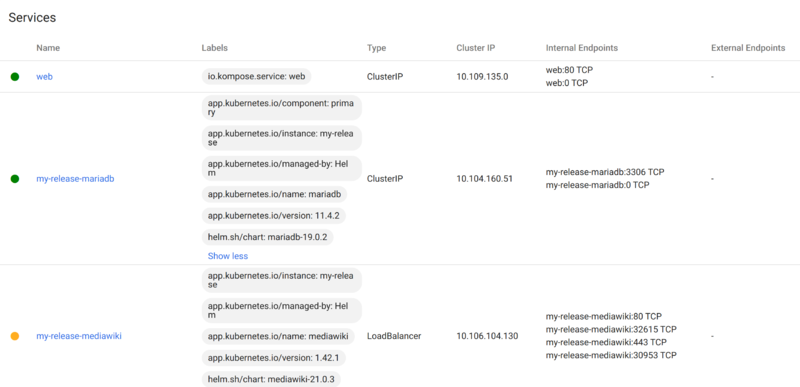Helm
From Freephile Wiki
Helm (github) describes itself as "the package manager for Kubernetes". Alternative to Kustomize, Helm is a tool for managing Charts. Charts are packages of pre-configured Kubernetes resources.
Use Helm to:
- Find and use popular software packaged as Helm Charts to run in Kubernetes
- Share your own applications as Helm Charts
- Create reproducible builds of your Kubernetes applications
- Intelligently manage your Kubernetes manifest files
- Manage releases of Helm packages
Examples[edit]
Assuming you already have Helm installed and you have a running Kubernetes cluster (start out with minikube), you could issue the following to "install" the MediaWiki application (chart) offered by Bitnami (as contained in the docker.io registry). The name of the application (called a "release") would be "my-release".
helm install my-release oci://registry-1.docker.io/bitnamicharts/mediawiki
This would produce output like the following:
Pulled: registry-1.docker.io/bitnamicharts/mediawiki:21.0.3 Digest: sha256:43a905d16c40c05f290b6e19db684dfe2d75677f3a6c7ce1c0b3ac81897beb9c NAME: my-release LAST DEPLOYED: Thu Aug 1 18:32:54 2024 NAMESPACE: default STATUS: deployed REVISION: 1 TEST SUITE: None NOTES: CHART NAME: mediawiki CHART VERSION: 21.0.3 APP VERSION: 1.42.1 ** Please be patient while the chart is being deployed **############################################################################### ### ERROR: You did not provide an external host in your 'helm install' call ### ###############################################################################
It goes on
This deployment will be incomplete until you configure Mediawiki with a resolvable host. To configure Mediawiki with the URL of your service: 1. Get the Mediawiki URL by running: NOTE: It may take a few minutes for the LoadBalancer IP to be available. Watch the status with: 'kubectl get svc --namespace default -w my-release-mediawiki' export APP_HOST=$(kubectl get svc --namespace default my-release-mediawiki --template "{{ range (index .status.loadBalancer.ingress 0) }}{{ . }}{{ end }}") export APP_PASSWORD=$(kubectl get secret --namespace default my-release-mediawiki -o jsonpath="{.data.mediawiki-password}" | base64 -d) export MARIADB_ROOT_PASSWORD=$(kubectl get secret --namespace default my-release-mariadb -o jsonpath="{.data.mariadb-root-password}" | base64 -d) export MARIADB_PASSWORD=$(kubectl get secret --namespace default my-release-mariadb -o jsonpath="{.data.mariadb-password}" | base64 -d) 2. Complete your Mediawiki deployment by running: helm upgrade --namespace default my-release oci://registry-1.docker.io/bitnamicharts/mediawiki \ --set mediawikiHost=$APP_HOST,mediawikiPassword=$APP_PASSWORD,mariadb.auth.rootPassword=$MARIADB_ROOT_PASSWORD,mariadb.auth.password=$MARIADB_PASSWORD 2. Get your MediaWiki login credentials by running: echo Username: user echo Password: $(kubectl get secret --namespace default my-release-mediawiki -o jsonpath="{.data.mediawiki-password}" | base64 -d) WARNING: There are "resources" sections in the chart not set. Using "resourcesPreset" is not recommended for production. For production installations, please set the following values according to your workload needs: - resources +info https://kubernetes.io/docs/concepts/configuration/manage-resources-containers/
If you have Kubernetes Dashboard installed you would see something like this
